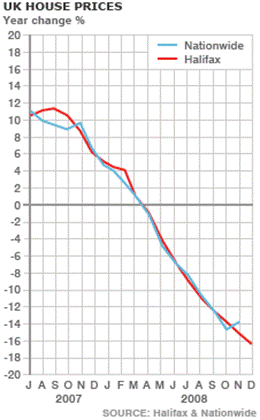 Welcome...kkk. to Buyabetterhome fgdfhgdfgdfgdfgdfgdf
Welcome...kkk. to Buyabetterhome fgdfhgdfgdfgdfgdfgdf 
According to the latest figures from the Halifax, house prices fell a further 2.2% in December – putting them on a par with levels not seen since 2004. The bank now cites the average house price at £159,896 with house prices falling a total of 16.2% over the year of 2008. This is the biggest annual decline since the Halifax starting keeping records in 1983. When set against earnings, property affordability is at its best since April 2003 says the bank. However, the lack of available mortgage finance makes something of a nonsense of this statement.
Despite being previously reluctant to make a prediction about what would happen to house prices in 2009, the Halifax have now stated that house prices will fall by 15% in the coming year. This is a particularly negative view, bearing in mind that most of the other big players have predicted a 10% fall. In fact, although the bank have said that the market is starting to stabilize at a “low level”, it said that house prices will continue to fall for some time to come. To quote Halifax chief economist, Martin Ellis: “Continuing pressures on incomes and the negative impact of the dislocation of the financial markets on the availability of mortgage finance are expected to exert future downward pressure on the market over the coming months”.

The Halifax’s figures may have been influenced by the latest data coming out of the Bank of England showing that mortgage approvals fell to a nine-year low in November – just 27,000. The number of mortgages approved (but not yet finalised) is seen as a good indicator of medium-term trends in lending. Although, in monetary terms, lending rose by £740m in November this figure was still less than 10% of the lending figure for November 2007. This data is the latest indication of the extent of the housing downturn and is likely to increase the pressure on commercial banks to raise lending levels. Although the latest Bank of England Credit Conditions survey reveals that most banks and building societies plan to continue to cut back on lending to individuals and businesses in the short term.
It has now been revealed that the Treasury may take measures to combat the current lack of mortgage lending as it sees the ability of individuals and businesses to obtain credit as the key to economic recovery. The latest government package being put together to further bail out the banks could include a “bad bank” where “toxic assets” could be left, or exchanged for government bonds. The government has already bailed out the banks to the tune of £37bn and there is anger that the banks are not doing more to help struggling businesses and homebuyers. A further cash injection could be “politically difficult” – angering taxpayers and giving the opposition further ammunition to state that the government’s original plan has failed.
Homeowners with a Nationwide tracker mortgage will not be feeling the benefit of any further interest rate cuts. A clause in the contract of 250,000 customers states that the building society does not have to lower its rates once the Bank of England base rate falls below 2.75%. Although Nationwide did not invoke this clause when the base rate fell to 2%, it has stated that rates will not be falling any further.